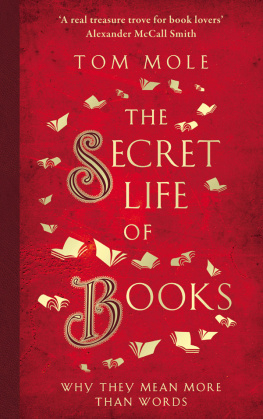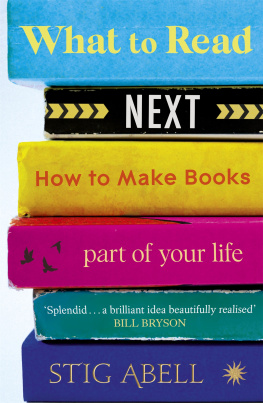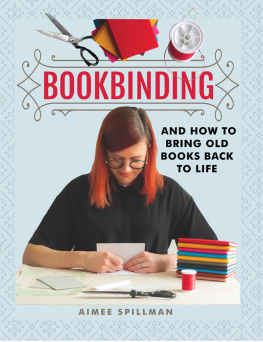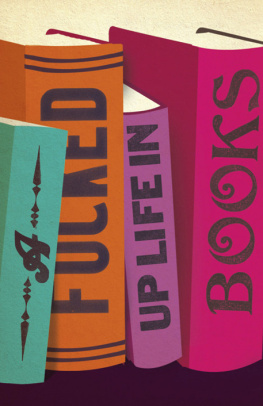Contents
Guide


CHARLES LAMB

To Freya
CONTENTS
ILLUSTRATIONS
1
BOOK/BOOK
The things we do to books and the things they do to us
W hen I was a student, one of my professors was almost driven out of his office by his books. He had a large room on the ground floor of the English department, with bookcases around the walls. Slowly but surely these bookcases had filled over the years, and other shelves had been squeezed into every available space in the office. The bookcases had started to sprout out from the walls into the room, creating book booths, book niches and book nooks. But these, in turn, proved insufficient for his ever-growing collection of books. Soon he started to pile books on top of the bookcases, and to stack them double on the shelves, so that he had to move the books in front in order to reveal the ones behind. Before long, the books had spilled onto the floor, where the piles encroached further and further into the room with each passing month.
Every time I visited the professors office, it seemed a little harder than before to navigate a route across the room on the decreasing area of visible carpet. Attempting to keep the books in some kind of order seemed like a full-time job. Id knock on the professors door and hear a muffled shout telling me to come in. But when I opened the door there was no professor to be seen the room was full of books, but apparently empty of its occupant. For a moment, I would think perhaps the professor had been crushed under a toppling pile of hardbacks. Then his head would appear from behind a ziggurat of volumes on a bewildering variety of topics. Just doing a bit of sorting out, hed say, as though he could ever hope to bring order to the ever-growing library that seemed, like the universe itself, to be continually expanding at an accelerating rate in every possible direction.
My professor was doing a number of things to his books. He was acquiring them choosing to buy these books rather than others. He was classifying them putting them onto shelves and into piles with other books. These categories might be based on some quality such as their subject matter (history on one shelf, biography on another), or their size (larger books on the floor, smaller ones on the shelves), or their place in the cycle of his reading (as-yet-unread ones over here; the ones he was currently reading over there; the ones he had finished reading but not yet shelved somewhere else). He was reading them, taking notes from them, referring back to them, citing them in the articles he was writing, using them to prepare his lectures, lending them to his students, and so on in an endless process of erudition and amusement.
But his books were also doing things to him. As well as pushing him out of his own office, they were shaping the spaces and the ways in which he worked. The books formed a complex ecosystem that he, too, inhabited. Sometimes, they made his work easier and better. Writing scholarly articles amid such a large private library allowed him to keep reference works, books by other scholars and the literature he was writing about within easy reach. All scholarship depends to some extent on other scholarship even when it reaches different conclusions and so the thousands of books he kept to hand assisted his work. Sometimes, on the other hand, the sheer number of books and their disorganised state must have made things more difficult. It must often have been tricky or impossible to find the book he wanted.
Eventually the department secretary decided enough was enough and sent in a structural engineer to test whether the building could take the weight of so many books. Armed with the engineers report, she persuaded the professor to give some books away. (He gave one to me.) But it was hard to convince him to downsize his library. His professional life, indeed his understanding of himself, was ranged around the shelves for all to see. Giving up some of his books felt like giving up part of his mind. There were benefits and difficulties in having such a large collection of books. But, for better or worse, his books were not just his passive tools; they were also exerting forces of their own on his life.

Sometimes, we think of books as tools for reading, but theres more to them than that. In this book the one youre reading now Im not all that interested in books as things to read. Instead, I want to talk about all the other things that we do to books and that books do to us. Our books are leading a double life. As well as being containers of words, they are things imbued with their own significance. Their importance as my professor understood goes far beyond the words or images they contain.
Books are part of how we understand ourselves. They shape our identities, even before we can read them. They accompany us throughout our lives at home, at school, at college and (for some of us, at least) at work. And books are also part of how we relate to other people, from those closest to us to those only distantly connected. They get tangled up in our relationships with parents, siblings, classmates, teachers, friends, lovers and children. They are part of how groups of people, and even whole nations, imagine and represent themselves. Books become meaningful objects in all sorts of ways: treasured possessions, talismans, bearers of significance. This book is about how that happens.
For readers, books are familiar objects. Maybe were too familiar with them to pay them much attention. We take them to bed with us. They weigh down our suitcases when we go on holiday. We display them on our bookshelves or store them in our attics. We give them as gifts. We write our names in them. We hoard them or discard them. We take them for granted. Over the last five hundred years, printed books have become a common sight so common that they are almost invisible. It requires an effort, a shift of perspective, to bring them into focus.
Today, we can make that effort because it has become possible to imagine the end of the book as we know it. We can perceive the book as an object because we think that object might be going away. When historians of the future look back to the early twenty-first century, they will describe it as a moment of media change as significant as the Western invention of printing with movable type in the second half of the fifteenth century. But as the epoch of print ends, printed books are not simply vanishing; instead, their significance is being transformed. Were historically well placed to understand this transformation.
And yet we often fail to understand it. If we think of books as just media just a way of conveying text and images then well expect them to give way to new media that do the job faster, more cheaply, more efficiently or more profitably. The strange tenacity of the paper book will seem puzzling. But once we understand the life of books as objects, and the many functions they serve in our lives, then well be better equipped to understand whats happening to them now.


















